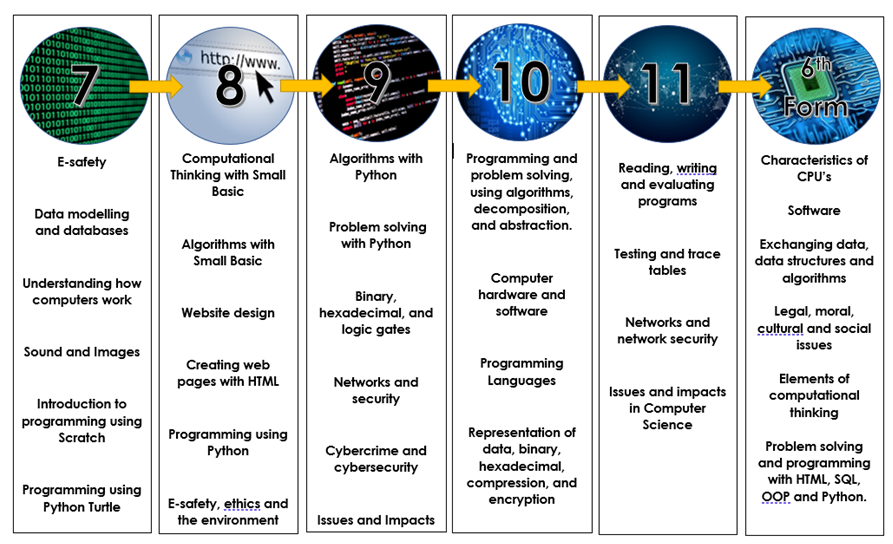- Home
- Sixth Form
- Curriculum
- Computer Science
Computer Science
Introduction
Studying A Level Computer Science provides the opportunity to your imagination and creativity, as well as your analytical, and critical thinking skills. Technology is embedded in every aspect of our lives. Computer Science is being used to help solve many of the world’s most pressing issues requiring technical skills and an innovative approach.
You will be taught a variety of programming languages such as Javascript, HTML, CSS, SQL and Python. You choose which language to use as part of your programming project which provides scope for students to be really creative with their project proposals.
A Computer Science A Level is valued by employers as it shows logical thinking, the ability to work independently and problem solve. It also leads into a degree in computer science, engineering or mathematics.
Aims
To develop students analytical and critical thinking skills to enable them be confident in a digital world.
To develop students abilities to think logically and problem solve providing skills for the next steps in education and employment.
To enable students to progress to further study through employment, apprenticeships and degree courses

Support for learning
The Rosetta Code website is useful for looking at programming problems and how they can be solved in different programming languages.
https://rosettacode.org/wiki/Category:Programming_Tasks
Craig N Dave video tutorials are fantastic for re-visiting topics. The idea with these is that you use the video clip in conjunction with the Cornell note taking method. This helps you to learn key terms and be able to apply them in context.
Craig N Dave OCR A Level Computer Science (You Tube clips)
Cornell note taking method;
https://craigndave.org/cornell-note-taking/
The OCR website has useful links to past papers, the course specification, and exemplar completed and assessed A Level projects.
https://www.ocr.org.uk/qualifications/as-and-a-level/computer-science-h046-h446-from-2015/
w3schools is the place to look if you want to learn a new programming language. You can learn everything from SQL to JavaScript!
The Future Learn website has a whole variety of Computer Science related courses available free of charge. A great place to follow a structured course in either Object Orientated Programming or Computational Thinking, for example. Most courses on offer are provided by universities and therefore provide something extra that can be added to your CV or personal statement.
Supporting Students outside the Classroom
Accessing work from home - Students in all years have a Google Classroom account where most lesson materials and home study can also be found. This can be accessed by students using their school Gmail accounts on any device.
Programming - The link below is very useful for students who wish to practice their programming but might not have Python, SQL or JavaScript installed locally.
Exam overview
OCR A Level Computer Science:
- Examination Level: A Level
- Examination Group: OCR
- Examination Value: 80%
- Examination Code: H446
The course contains 3 units with the AS and A Level content taught in tandem:
- Component 1 Computer Systems: 2 ½ hour exam, 140 marks, worth 40% of the overall qualification. A series of short and longer answers questions.
- Component 2 Computational Thinking and Programming: 2 ½ hour exam, 140 marks, worth 40% of the overall qualification. A series of short and longer answers questions.
- Component 3 Practical Programming Project: 70 marks worth 20% overall. Marked internally and moderated by OCR.
SOW overview
Component 1 Computer Systems:
- The characteristics of contemporary processors, input, output and storage devices.
- Software and software development
- Exchanging data
- Data types, data structures and algorithms
- Legal, moral, cultural and ethical issues
Component 2 Computational Thinking and Programming:
2.1 Elements of computational thinking
2.2 Problem solving and programming
2.3 Algorithms
Component 3 Practical Programming Project:
Student led programming project using a language of their choice. The project is split into analysis design, implementation, testing and evaluation sections.
Students will complete elements from Component 1 and 2 throughout Year 12 with planning work for Component 3 starting in the summer term of Year 12. Year 13 will see students complete their Component 3 and the remaining sections of 2.2 and 2.3. In the latter stages of Year 13 students will revise the topics covered in Components 1 and 2 in readiness for the A Level examination in the summer of Year 13.
Extra- Curricular
We offer support every Friday afterschool in room 118 between 3.30 – 4.10 for our KS4 and 5 students. This session is for any student that would like to further develop their skills and understanding of GCSE and A Level Computer Science. These sessions are run by Mr Coulson and Mrs Jagota.
Career Links
This course will provide a logical progression to a degree level course in the areas of computing, engineering and science. It will also provide a sound preparatory basis for studying industry standard IT qualifications as well as providing the knowledge, skills and understanding that a growing number of employers are demanding.
Example careers range from network manager, cybersecurity analyst, programmer, software engineer, to website designer, database administrator and systems analyst.
The typical starting salary for a computer science graduate is around £25,000, well above the average graduate salary of £23,000 in the UK in 2021.
A Level Results 2024
Congratulations to the Year 13 students on achieving:
Computing
Grades A*-C 33.33%


